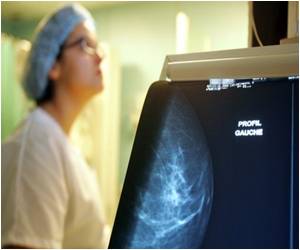
Karla Kerlikowske, M.D., of the University of California, San Francisco, and colleagues sought to determine whether the benefits, such as early detection, and the harms, such as a false-positive mammography result or biopsy recommendation, differ among women undergoing screening mammography according to age, breast density and postmenopausal HT use.
Researchers analyzed data collected from January 1994 to December 2008 from mammography facilities in community practice that participate in the Breast Cancer Surveillance Consortium (BCSC) mammography registries. Data were collected from 11,474 women with breast cancer and 922,624 without breast cancer.
The authors found that biennial vs. annual mammography for women ages 50 to 74 was not associated with an increased risk of advanced-stage or large-size tumors regardless of a women's breast density or HT use. However, the results indicate that among women ages 40 to 49 years with extremely dense breasts, biennial mammography vs. annual was associated with an increased risk of advanced-stage cancer (odds ratio [OR], 1.89) and large tumors (OR, 2.39).
Study results also show that the cumulative probability of a false-positive mammography result was high among women undergoing annual mammography with extremely dense breasts who were either ages 40 to 49 years (65.5 percent) or used estrogen plus progestogen (65.8 percent) and was lower among women ages 50 to 74 years who underwent biennial or triennial mammography with scattered fibroglandular densities or fatty breasts.
"In conclusion, women aged 50 to 74 years, regardless of breast density or HT use, can undergo biennial rather than annual mammography because biennial screening does not increase the risk of presenting with advanced disease but does substantially reduce the cumulative risk of a false-positive mammography result and biopsy recommendation. Women aged 40 to 49 years with extremely dense breasts who choose to undergo mammography should consider annual screening to decrease the risk of advanced-stage disease but should be informed that annual screening leads to a high cumulative probability of a false-positive mammography result because of the additional screening examinations," the study concludes.
Advertisement














